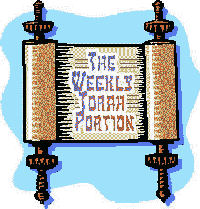|
Purity of Spirit
By Michael Chessen
This Torah reading of Tazria deals primarily
with the oft misunderstood concept of ritual purity and its converse,
ritual "uncleanliness". The Hebrew term, "tamei" has nothing to do with
sanitation, and is used to describe only the spiritual ramifications for
those individuals (or even houses) that have undergone some form of
spiritual transformation.
The first such transformation which the Torah describes is that of a
woman who has been blessed with the holy honor of bringing a child into
the world. Her ensuing post-natal bleeding is compared to that of her
monthly menstrual flow; in either case the woman must undergo a period of
refraining from having physical relations with her husband. We should,
therefore, properly view a woman's blood-flow as a condition which
temporarily prevents marital relations, rather than a factor which renders
a woman individually "impure". For whereas the proper service of God fully
includes physical relations between man and woman within the proper
spiritual context, as the Torah suggests, men are actually in greater need
of assistance in order to harness their physical drives in order that they
not lead them towards transgression.
In the context of this discussion of conditions which either allow
or
prohibit marital relations, the Torah chooses to reiterate the commandment
of circumcision, originally given to the patriarch Abraham. It is
recounted in the book of Genesis that Abraham apparently had failed to
fully "notice" his wife's beauty until they were en route to Egypt and he
had to consider how the local residents would view her. His later dutiful
fulfillment of God's commandment to circumcise himself at the age of
ninety-nine was primarily a test of faith.
In our opening portion of
Tazria, Nachmanonides views the repetition of this commandment as serving
to present circumcision as a reminder of holiness and possible "last line
of defense" to prevent a man from going astray for a fleeting moment of
transient but potentially tragically costly pleasure. This is because no
man is capable of fully ignoring the physical testament of the covenant
which God made with Abraham.
The Torah continues discussion of ritual impurity by focusing on what
is translated as leprosy. However, whereas the individual inflicted with
this condition is to be isolated from his community, this has nothing to
do with the reasons that modern lepers are quarantined. Rather,Torah
leprosy is a "measure for measure" punishment. It results from an
individual's attempt to slander his fellow. Since the intention of slander
is to somehow separate and isolate another individual, the necessary
remedy for this is to have the slanderer himself undergo a prescribed
period of isolation.
Whereas King Solomon prescribed a happy heart as good and perhaps
very timely medicine, those who fail to heed this advice are liable to
require considerably less pleasant means of spiritual healing.
Spiritual Purity
by Avi Lazerson
It may seem backwards, but in this week's Torah portion, the laws of a "leper" are discussed. We are all familiar with the leper, an outcast due to the lesions on his body. He is sent out of the camp to dwell alone.
Modern science has told us that leprosy is really a disease and if properly treated can be cured. Many medical personel work on this problem today in Africa.
But the sages tell us that what is described in the Torah is not the same leprosy as is found in Africa. The leprosy of the Bible is no longer around. What is called leprosy today is an affliction that possesses perhaps some similarity, but is not the same.
Why does the leprosy mentioned in the Bible not exist today?
Our sages taught us that the affliction that we call leprosy existed only durring the time that the Jewish people left Egypt until the destruction of the Temple. Why? Because the disease was a spiritually generated disease.
There are many causes of illnesses. Obviously there is the physical cause: germs, chills, poor diet, etc. But there is also a spiritualy caused illness. A person who trespasses on the laws of the Creator must realize that there is a price to pay. Sometimes this comes in the form of a sickness.
This was the case of the Jewish people. The Jewish people, who left Egypt were at the highest levels of divine revelation. They saw the Ten Commandments being given at Mount Sinai (as opposed to seeing it at a movie theater). They lived with daily miracles, the miraculous "manna", the spliting of the Dead Sea, water coming out of a rock, etc.
For people of this spiritual dimension to sin, was a terrible thing, much worse that of someone who never had any divine revelation. These people who were on such a lofty spiritual level egaged in a sin called Lashon HaRa, nasty gossip and slander about their fellow Jew. Instead of judging their friends action in a favorable manner, they enjoyed speaking lowly about him. For this generation, this was a terrible sin.
They were punished by having leprosy. A spiritual incurred disease. Today, we are not even close to the spiritual level of our ancestors. When we sin, we are not always capable of knowing what we are doing. For this reason, this disease has disappeared.
However, the lesson to be learnt from this is that lack of attention to spiritual matters can cause physical maladies.
Wishing you all a Shabbat Shalom !

|
